5 books about Cape of Good Hope (South Africa)
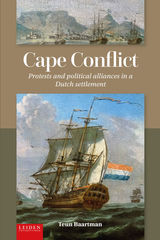
Cape Conflict
Protest and Political Alliances in a Dutch Settlement
Teun Baartman
Leiden University Press, 2019
From 1652 until 1795, the Cape of Good Hope was a Dutch settlement marked by tensions, often portrayed as antagonism between the oppressive Dutch East India Company (VOC) and the Cape’s aggrieved burghers. However, by comparing the political structures, institutions and dynamics of the Dutch Republic and its overseas settlement, the Teun Baartman demonstrates that this relationship was more cooperative and that the Cape burghers were able to influence policies in their favor similar to the way burghers in the Dutch Republic did by forming political factions. Using the Cape Conflict of the later eighteenth century as a case study, Baartman illustrates that it was in fact a fight for power between factions within the ruling elite, which consisted of both VOC officials and burghers. This book offers new evidence, a variety of interpretations, and an innovative narrative about where burghers came from, what their position was, and how the Cape political world operated.
[more]
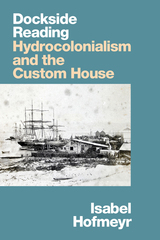
Dockside Reading
Hydrocolonialism and the Custom House
Isabel Hofmeyr
Duke University Press, 2022
In Dockside Reading Isabel Hofmeyr traces the relationships among print culture, colonialism, and the ocean through the institution of the British colonial Custom House. During the late nineteenth and early twentieth centuries, dockside customs officials would leaf through publications looking for obscenity, politically objectionable materials, or reprints of British copyrighted works, often dumping these condemned goods into the water. These practices, echoing other colonial imaginaries of the ocean as a space for erasing incriminating evidence of the violence of empire, informed later censorship regimes under apartheid in South Africa. By tracking printed matter from ship to shore, Hofmeyr shows how literary institutions like copyright and censorship were shaped by colonial control of coastal waters. Set in the environmental context of the colonial port city, Dockside Reading explores how imperialism colonizes water. Hofmeyr examines this theme through the concept of hydrocolonialism, which puts together land and sea, empire and environment.
[more]
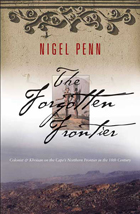
The Forgotten Frontier
Colonist and Khoisan on the Cape's Northern Frontier in the 18th Century
Nigel Penn
Ohio University Press, 2006
A 2007 CHOICE Outstanding Academic Title
Traditionally, the Eastern Cape frontier of South Africa has been regarded as the preeminent contact zone between colonists and the Khoi (“Hottentots”) and San (“Bushmen”). But there was an earlier frontier in which the conflict between Dutch colonists and these indigenous herders and hunters was in many ways more decisive in its outcome, more brutal and violent in its manner, and just as significant in its effects on later South African history.
This was the frontier north of Cape Town, where Dutch settlers began advancing into the interior. By the end of the eighteenth century, the frontier had reached the Orange (Gariep) River. The indigenous Khoisan people, after initial resistance, had been defeated and absorbed as an underclass into the colonial world or else expelled beyond it, to regions where new creole communities emerged.
Nigel Penn is a master storyteller who brings a novelist’s sensitivity to plot and character and a command of the archival record to bear in recovering this epic and forgotten story. Filled with extraordinary personalities and memorable episodes, and set in the often harsh landscape of the Western and Northern Cape, The Forgotten Frontier will appeal both to the general reader and to the student of history.
Traditionally, the Eastern Cape frontier of South Africa has been regarded as the preeminent contact zone between colonists and the Khoi (“Hottentots”) and San (“Bushmen”). But there was an earlier frontier in which the conflict between Dutch colonists and these indigenous herders and hunters was in many ways more decisive in its outcome, more brutal and violent in its manner, and just as significant in its effects on later South African history.
This was the frontier north of Cape Town, where Dutch settlers began advancing into the interior. By the end of the eighteenth century, the frontier had reached the Orange (Gariep) River. The indigenous Khoisan people, after initial resistance, had been defeated and absorbed as an underclass into the colonial world or else expelled beyond it, to regions where new creole communities emerged.
Nigel Penn is a master storyteller who brings a novelist’s sensitivity to plot and character and a command of the archival record to bear in recovering this epic and forgotten story. Filled with extraordinary personalities and memorable episodes, and set in the often harsh landscape of the Western and Northern Cape, The Forgotten Frontier will appeal both to the general reader and to the student of history.
[more]
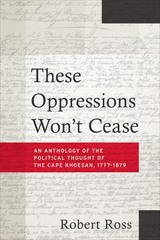
These Oppressions Won’t Cease
An Anthology of the Political Thought of the Cape Khoesan, 1777-1879
Robert Ross
University of Cincinnati Press, 2018
The Khoesan were the first people in Africa to undergo the rigors of European colonization. By the early nineteenth century, they had largely been brought under colonial rule, dispossessed of their land and stock, and forced to work as laborers for farmers of European descent. Nevertheless, a portion of them were able to regain a degree of freedom and maintain their independence by taking refuge in the mission stations of the Western and Eastern Cape, most notably in the Kat River valley. Through petitions, speeches at meetings, letters to the newspapers and correspondence between themselves, the Cape Khoesan articulated a continuous critique of the oppressions of colonialism, always stressing the need for equality before the law, as well as their opposition to attempts to limit their freedom of movement through vagrancy legislation and related measures. This was accompanied by a well-grounded distrust of the British settlers in the Eastern Cape and a concomitant hope, rarely realized, in the benevolence of the British government in London. Comprising 98 texts, These Oppressions Won’t Cease – was an utterance expressed by Willem Uithaalder, commander of Khoe rebel forces in the war of 1850-53 – contains the essential documents of Khoesan political thought in the nineteenth century.
[more]
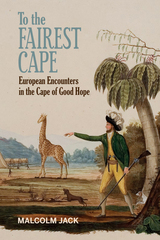
To the Fairest Cape
European Encounters in the Cape of Good Hope
Jack, Malcolm
Bucknell University Press, 2019
Crossing the remote, southern tip of Africa has fired the imagination of European travellers from the time Bartholomew Dias opened up the passage to the East by rounding the Cape of Good Hope in 1488. Dutch, British, French, Danes, and Swedes formed an endless stream of seafarers who made the long journey southwards in pursuit of wealth, adventure, science, and missionary, as well as outright national, interest. Beginning by considering the early hunter-gatherer inhabitants of the Cape and their culture, Malcolm Jack focuses in his account on the encounter that the European visitors had with the Khoisan peoples, sometimes sympathetic but often exploitative from the time of the Portuguese to the abolition of slavery in the British Empire in 1833. This commercial and colonial background is key to understanding the development of the vibrant city that is modern Cape Town, as well as the rich diversity of the Cape hinterland.
Published by Bucknell University Press. Distributed worldwide by Rutgers University Press.
Published by Bucknell University Press. Distributed worldwide by Rutgers University Press.
[more]
READERS
Browse our collection.
PUBLISHERS
See BiblioVault's publisher services.
STUDENT SERVICES
Files for college accessibility offices.
UChicago Accessibility Resources
home | accessibility | search | about | contact us
BiblioVault ® 2001 - 2024
The University of Chicago Press









